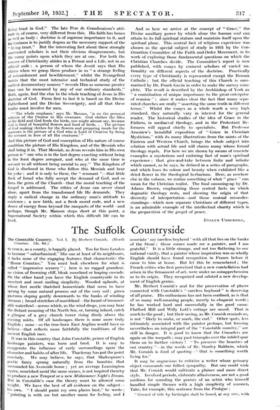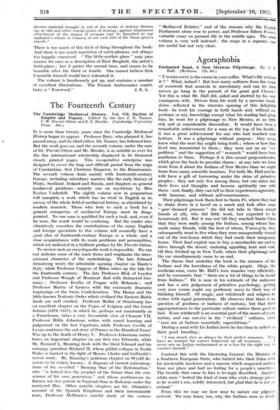The Suffolk Countryside
SUFFOLK, as a county, is happily placed. Too far from London to become " suburbanized," like one at least of its neighbours, it lacks none of the engaging features that characterin the "Home Counties." You mast look elsewhere for what is called "impressive scenery " ; here is no rugged grandeur, no vision of frowning cliff, bleak moorland or leaping cascade. On the other hand you have the English countryside in its sweetest and most smiling simplicity. Wooded uplands, at whose feet nestle thatched homesteads that seem to have sprung by some natural process out of the very soil ; green pastures sloping gently downwards to the banks of winding streams ; broad stretches of marshland—the haunt of innumer- able waterfowl—across which, as the wind drops, you may hear the distant moaning of the North Sea, or, turning inland, catch a glimpse of a grey church tower rising dimly above the evening mists. Of all landscapes there is none more truly English ; none—so the true-born East Anglian would have ILS believe—that reflects more faithfully the traditions of the ancient English race.
It was in this country that John Constable, prince of English landscape painters, was born and bred. It is easy to exaggerate the influence of early surroundings upon ' the character and habits of after life. Thaekeray has put the point Concisely. We may believe, he says, that Shakespeare's Poetic fancy sprang naturally from the beauties that surrounded his Avonside home ; yet an average Leamington Squire, nourished amid the same scenes, is not inspired thereby to Produce a new Tempest or a new Midsummer Night's Dream. But in Constable's case the theory must be allowed some weight. We have the best of all evidence on the subject— his own. "I should paint my own places best," he wrote ; "painting is with me but another name for feeling, and I associate my careless boyhood 'with all that lies on the banks) of the Stour ; those scenes made me a painter, and I am grateful." It is a little strange, and not too flattering to our national vanity, that a painter whose inspiration was so wholly English should have found recognition in France before it came to him at home. But let this be remembered ; the French critics who first perceived that a new constellation had arisen in the firmament of art, were under no misapprehension as to its origin. They recognized and saluted a new develop- ment of English genius.
Mr. Herbert Cornish's zeal for the preservation of places connected with Constable's "careless boyhood" is deserving of all praise. His enthusiasm has not been confined, as is that of so many well-meaning people, merely to eloquent words ; he has worked hard and successfully in the good cause. Flatford Mill and Willy Lott's Cottage are saved. That is much to the good ; but their saving, as Mr. Cornish reminds us, is not "likely to make, or mark, the end." Other spots, less intimately associated with the painter perhaps, but forming nevertheless an integral part of the "Constable country," are still in danger. It is good to know that the Crusaders are again on the warpath ; may past triumphs over the infidel spur them on to further victory ! " To preserve the beauties of our country "—in the words of Mr. Stanley Baldwin, which Mr. Cornish is fond of quoting—" that is something worth living for."
It may be ungracious to criticize a writer whose primary object commands our fullest. sympathy. But one could wish that Mr. Cornish would cultivate a plainer and more direct style. Involved periods, elaborate allusiveness, are not a good medium for sounding the praises of an artist who himself handled simple themes with a high simplicity of manner. Take, for example, this sentence from the Prologue : "Ground of title by birthright shall be found, at any rate, with
diverse material brought in aid of the works of defence thrown up, at this and other crucial points of strategy, against whatsoever attachment of the stigma of trespass may be launched at our apologist's seizure in tenancy of one such fold of the Name-giver's mantle."
There is too much of this kind of thing throughout the book.
And there is too much repetition of catch-phrases, not always too happily conceived. "The little-mother place" may pass muster for once as a description of East Bergholt, the artist's birth-place ; but it grates the second time, and ceases' to be bearable 'after the third or fourth. One 'cannot believe that Constable himself would have tolerated it.
The volume is handsomely got up, and contains a number of excellent illustrations. The French Ambassador Contri-































 Previous page
Previous page